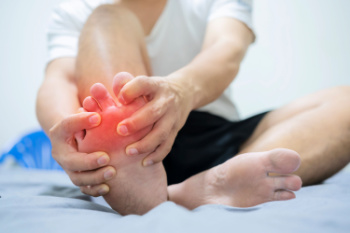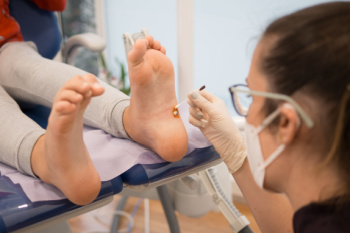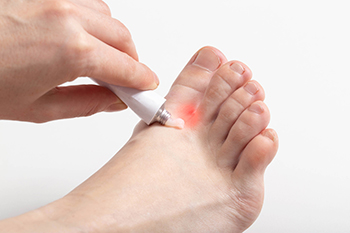Connect With Us
Blog
Items filtered by date: September 2024
Possible Causes of Tingling and Numbness in the Toes

Numbness and tingling in the toes can result from various causes, often indicating nerve or circulation issues. One common cause is peripheral neuropathy, where nerves are damaged due to conditions like diabetes, leading to loss of sensation. Poor circulation, such as from peripheral artery disease, or PAD, can also reduce blood flow to the toes, causing tingling or numbness. Tarsal tunnel syndrome occurs when the tibial nerve, located near the ankle, becomes compressed, leading to numbness, tingling, or pain in the toes. Morton’s neuroma is another condition where a thickening of the tissue surrounding a nerve between the toes causes similar symptoms, often triggered by wearing tight shoes or high heels. If numbness and tingling are persistent or worsen, it is suggested that you consult a podiatrist, especially if the symptoms include pain or difficulty walking, as they could signal a more serious underlying condition requiring prompt attention.
Toe pain can disrupt your daily activities. If you have any concerns, contact David Cain, DPM of Iowa. Our doctor can provide the care you need to keep you pain-free and on your feet.
What Causes Toe Pain?
Most severe toe pain is caused due to a sports injury, trauma from dropping something heavy on the toe, or bumping into something rigid. Other problems can develop over time for various reasons.
Toe pain can be caused by one or more ailments. The most common include:
- Trauma
- Sports injury
- Wearing shoes that are too tight
- Arthritis
- Gout
- Corns and calluses
- Hammertoe
- Bunions
- Blisters
- Ingrown toenails
- Sprains
- Fractures (broken bones)
- Dislocations
When to See a Podiatrist
- Severe pain
- Persistent pain that lasts more than a week
- Signs of infection
- Continued swelling
- Pain that prevents walking
Diagnosis
In many cases the cause of toe pain is obvious, but in others, a podiatrist may want to use more advanced methods to determine the problem. These can range from simple visual inspections and sensation tests to X-rays and MRI scans. Prior medical history, family medical history, and any recent physical traumatic events will all be taken into consideration for a proper diagnosis.
Treatment
Treatments for toe pain and injuries vary and may include shoe inserts, padding, taping, medicines, injections, and in some cases, surgery. If you believe that you have broken a toe, please see a podiatrist as soon as possible.
If you have any questions please feel free to contact our office located in Ames, Iowa . We offer the newest diagnostic tools and technology to treat your foot and ankle needs.
Effective Exercises for Managing Foot Arthritis

Managing foot arthritis effectively involves incorporating specific exercises to maintain mobility and reduce pain. Gentle stretching exercises, such as toe stretches and Achilles tendon stretches, can enhance flexibility and alleviate stiffness. Strengthening exercises like towel curls, where you use your toes to scrunch a towel towards you, help build the muscles supporting the foot. Additionally, balancing exercises, such as standing on one leg, improve stability and support joint function. Low-impact activities, like swimming or cycling, provide a full range of motion without excessive stress on the feet. Regularly performing these exercises can reduce inflammation, increase foot strength, and improve overall comfort. If you have foot arthritis, it is suggested that you are under the care of a podiatrist who can help you better manage this condition.
Arthritis can be a difficult condition to live with. If you are seeking treatment, contact David Cain, DPM from Iowa. Our doctor can provide the care you need to keep you pain-free and on your feet.
Arthritic Foot Care
Arthritis is a joint disorder that involves the inflammation of different joints in your body, such as those in your feet. Arthritis is often caused by a degenerative joint disease and causes mild to severe pain in all affected areas. In addition to this, swelling and stiffness in the affected joints can also be a common symptom of arthritis.
In many cases, wearing ill-fitting shoes can worsen the effects and pain of arthritis. Wearing shoes that have a lower heel and extra room can help your feet feel more comfortable. In cases of rheumatoid arthritis, the arch in your foot may become problematic. Buying shoes with proper arch support that contour to your feet can help immensely.
Alleviating Arthritic Pain
- Exercises that stretch the foot can prevent further pain and injury and increase mobility
- Most of the pain can be alleviated with anti-inflammatory drugs, heat, and topical medications
- Massages can help temporarily alleviate pain.
It is best to see your doctor for the treatment that is right for your needs and symptoms. Conditions vary, and a podiatrist can help you determine the right method of care for your feet.
If you have any questions, please feel free to contact our office located in Ames, Iowa . We offer the newest diagnostic tools and technology to treat your foot and ankle needs.
Symptoms and Treatment of Plantar Warts

Plantar warts, caused by the human papillomavirus, or HPV, often develop on the soles of the feet, leading to discomfort, especially while walking. Highly contagious plantar warts typically appear as firm, rough, and flat lesions, often with small black dots at the center. They commonly affect people who use communal showers, pools, or changing areas. While plantar warts can affect anyone, people with a weakened immune system are particularly vulnerable. Diagnosis of plantar warts is generally made through visual examination to differentiate the wart from similar skin conditions, like corns or calluses. Treatment provided by a podiatrist may include cryotherapy, where the wart is frozen off, or the application of topical salicylic acid to dissolve the wart over time. A podiatrist can also offer more advanced options if the wart resists initial treatment. If you have developed a plantar wart, it is suggested that you schedule an appointment with a podiatrist for a diagnosis and treatment.
Plantar warts can be very uncomfortable. If you need your feet checked, contact David Cain, DPM from Iowa. Our doctor will assist you with all of your foot and ankle needs.
About Plantar Warts
Plantar warts are the result of HPV, or human papillomavirus, getting into open wounds on the feet. They are mostly found on the heels or balls of the feet.
While plantar warts are generally harmless, those experiencing excessive pain or those suffering from diabetes or a compromised immune system require immediate medical care. Plantar warts are easily diagnosed, usually through scraping off a bit of rough skin or by getting a biopsy.
Symptoms
- Lesions on the bottom of your feet, usually rough and grainy
- Hard or thick callused spots
- Wart seeds, which are small clotted blood vessels that look like little black spots
- Pain, discomfort, or tenderness of your feet when walking or standing
Treatment
- Freezing
- Electric tool removal
- Laser Treatment
- Topical Creams (prescription only)
- Over-the-counter medications
To help prevent developing plantar warts, avoid walking barefoot over abrasive surfaces that can cause cuts or wounds for HPV to get into. Avoiding direct contact with other warts, as well as not picking or rubbing existing warts, can help prevent the further spread of plantar warts. However, if you think you have developed plantar warts, speak to your podiatrist. He or she can diagnose the warts on your feet and recommend the appropriate treatment options.
If you have any questions please feel free to contact our office located in Ames, Iowa . We offer the newest diagnostic and treatment technologies for all your foot and ankle needs.
Facts About Athlete’s Foot

Athlete's foot, medically known as tinea pedis, is a fungal infection that affects the skin on the feet. It commonly manifests in three types, interdigital, moccasin, and vesicular. Interdigital occurs between the toes, moccasin causes scaling on the soles, and vesicular causes fluid-filled blisters. Athlete's foot is caused by fungi that thrive in warm, moist environments, like locker rooms or damp shoes. Symptoms typically include itching, redness, and peeling of the skin, often accompanied by a burning sensation. The infection can spread to other areas of the body if not treated promptly. Maintaining good foot hygiene, keeping feet dry, and wearing breathable footwear can help prevent athlete's foot. If you have an athlete’s foot infection, it is suggested that you promptly visit a podiatrist who can effectively treat this highly contagious condition.
Athlete’s foot is an inconvenient condition that can be easily reduced with the proper treatment. If you have any concerns about your feet and ankles, contact David Cain, DPM from Iowa. Our doctor will treat your foot and ankle needs.
Athlete’s Foot: The Sole Story
Athlete's foot, also known as tinea pedis, can be an extremely contagious foot infection. It is commonly contracted in public changing areas and bathrooms, dormitory style living quarters, around locker rooms and public swimming pools, or anywhere your feet often come into contact with other people.
Solutions to Combat Athlete’s Foot
- Hydrate your feet by using lotion
- Exfoliate
- Buff off nails
- Use of anti-fungal products
- Examine your feet and visit your doctor if any suspicious blisters or cuts develop
Athlete’s foot can cause many irritating symptoms such as dry and flaking skin, itching, and redness. Some more severe symptoms can include bleeding and cracked skin, intense itching and burning, and even pain when walking. In the worst cases, Athlete’s foot can cause blistering as well. Speak to your podiatrist for a better understanding of the different causes of Athlete’s foot, as well as help in determining which treatment options are best for you.
If you have any questions please feel free to contact our office located in Ames, Iowa . We offer the newest diagnostic and treatment technologies for all your foot and ankle needs.
